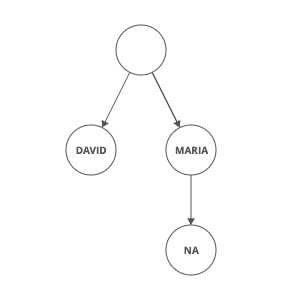Trie (Prefix Tree)
Definition
The Trie data structure is a tree-like data structure used to efficiently store and retrieve keys in a set of strings. The structure supports operations such as insertion, search and deletion of keys. Some applications of this data structure include auto-complete and spell checker systems.
Costs
| Worst Case | |
|---|---|
| space | \(O(n * k)\) |
| insert | \(O(k)\) |
| lookup | \(O(K)\) |
Suitable situation
- Tries are useful where you have a fixed dictionary you want to look up quickly
Strength & Weaknesses
Strength:
- Sometimes Space-Efficient: If you're storing lots of words that start with similar patterns, tries may reduce the overall storage cost by storing shared prefixes once.
- Efficient Prefix Queries: Can do sub string
searching in linear time, without pre processing the string every time.
Tries also can quickly answer queries about words with shared prefixes,
like:
- How many words start with "choco"?
- What's the most likely next letter in a word that starts with "strawber"?
Weaknesses:
- Usually Space-Inefficient: Tries rarely save space when compared to storing strings in a set.
- Not Standard: Most languages don't come with a built-in trie implementation. You'll need to implement one yourself.
Relevant Coding Questions
Python
1 | |
Similar Data Structures
Radix Tree
A radix tree is like a trie, but it saves space by combining nodes together if they only have one child.
Here's what a radix tree with "Maria", "Mariana", and "David" looks like.

The radix tree with "MARIA", "MARIANA", and "DAVID" where the first node is empty and directs to the children nodes "David" and "Maria", and "Maria" has one children node which contains "NA". Notice how it has way fewer nodes and links than the trie version we looked at above.
Radix trees are more cache friendly than tries, since the characters within a single node are usually stored in an array of characters, adjacent to each other in memory.
Others
- ternary search trees
- HAT-tries
- burst tries